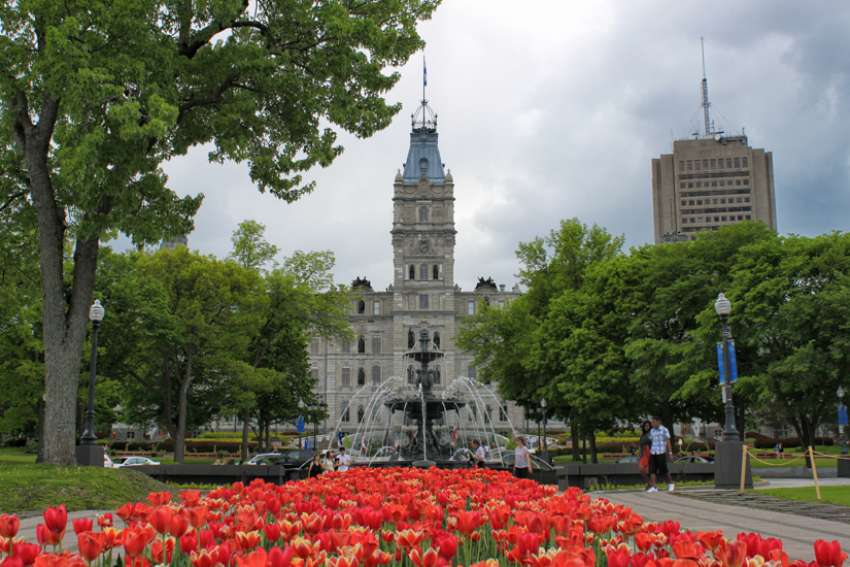Opponents of Bill 21, which bans some public servants such as teachers, police officers and judges in Quebec from wearing religious symbols while at work, are disappointed that their effort to have Quebec’s court of appeal suspend the law, but are vowing to continue the fight when the legal merits of the bill are argued in Quebec Superior Court in 2020.
“We are not done fighting this unjust law,” said Noa Mendelsohn Aviv, equality program director of the Canadian Civil Liberties Association (CCLA), after the Quebec Court of Appeal ruled in a 2-1 decision that was released on Dec. 12
The CCLA and the National Council of Canadian Muslims (NCCM) joined forces and were the first groups to launch a legal challenge to Bill 21, a bill that has been severely criticized both in Quebec and across Canada by religious groups, human rights organizations and some politicians for infringing on the religious freedom of Canadian citizens. Since the CCLA and NCCM launched their court challenge, other challenges have been filed, including by the largest English language school board in Quebec.
However, the challenges to the law face a tough hurdle since the Quebec government invoked the notwithstanding clause of the Canadian Constitution in an effort to shield it from being challenged legally.
“While we are disappointed with the result, we never thought that fighting for the rights of Quebecers and Canadians would be easy,” said Mustafa Farooq, the executive director of the NCCM. “We are reviewing our options now. We will always stand to protect the rights of all Quebecers.”
The court ruled that it would not suspend aspects of the law before the primary cases against the law are heard in court, and it appears that the use of the notwithstanding clause by the Quebec government was a critical factor in their decision.
Both of the judges who ruled not to suspend the law cited the use of the clause as a reason for not being able to act, although all three of the judges hearing the appeal indicated that indeed the law has had negative consequences for some Quebecers.
Lawyers for the two groups involved in this specific case had asked for an injunction against the law previously that was denied, but they were allowed to appeal that decision. In their appeal, which heard final arguments on Nov. 26, they argued to the court that Bill 21 overwhelmingly targets women because the people being most directly impacted since the law came into effect last June are women who wear head coverings.
Their legal argument was the law should be stuck down because Quebec’s so-called secularism law violates the sexual equality guarantees in Section 28 of the Canadian Charter of Rights and Freedoms, and they claimed that Section 28 can’t be shielded from challenge by the notwithstanding clause because it does not apply to that section.
“Today’s devastating decision brings no relief to the teachers who cannot work in their professions, the parents worried about supporting their children, and the individuals concerned for their future. This suffering has been imposed for no other reason than what one wears, how one practices religion, or the fact that one looks ‘different’ than the majority,” the CCLA’s Mendelsohn Aviv said of the appeal court ruling.
The CCLA and NCCM’s primary case challenging the legality of the Quebec bill is expected to be heard in Quebec Superior Court next fall.
The Quebec government’s justice minister welcomed the appeal court ruling, and indicated that the Quebec government would continue to vigorously fight any challenges to Bill 21 in court.
Many human rights and religious groups have been calling on the federal government to get involved in the legal challenges to Bill 21, but so far the federal government’s position has been to stay out of the Quebec court cases while holding out the possibility of getting involved if those cases eventually end up in Canada’s Supreme Court.
However, the federal Liberals now have a minority government, and the leaders of all the other main parties in the House of Commons indicated during the recent Oct. 21 federal election that they did not have any appetite to challenge Quebec’s right to do as it pleases on this issue within Quebec.
Both the CCLA and NCCM said previously that they know the court fight against Bill 21 could go on for years, and that they were prepared to fight the law for however long that takes.
“We know this has the potential to go all the way to the Supreme Court, and we could be looking at a long battle of five-to-seven years,” a statement on the CCLA website said, adding “and we will fight this to the very end.”


